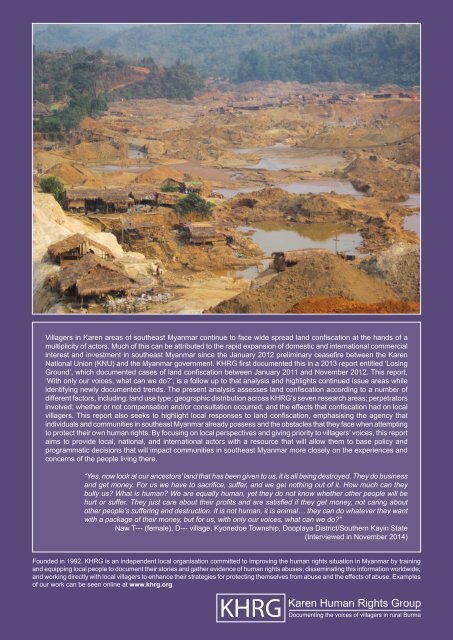With only our voices (English)
You also want an ePaper? Increase the reach of your titles
YUMPU automatically turns print PDFs into web optimized ePapers that Google loves.
Villagers in Karen areas of southeast Myanmar continue to face wide spread land confi scation at the hands of a<br />
multiplicity of actors. Much of this can be attributed to the rapid expansion of domestic and international commercial<br />
interest and investment in southeast Myanmar since the January 2012 preliminary ceasefi re between the Karen<br />
National Union (KNU) and the Myanmar government. KHRG fi rst documented this in a 2013 report entitled ‘Losing<br />
Ground’, which documented cases of land confi scation between January 2011 and November 2012. This report,<br />
‘<strong>With</strong> <strong>only</strong> <strong>our</strong> <strong>voices</strong>, what can we do?’, is a follow up to that analysis and highlights continued issue areas while<br />
identifying newly documented trends. The present analysis assesses land confi scation according to a number of<br />
different factors, including: land use type; geographic distribution across KHRG’s seven research areas; perpetrators<br />
involved; whether or not compensation and/or consultation occurred; and the effects that confi scation had on local<br />
villagers. This report also seeks to highlight local responses to land confi scation, emphasising the agency that<br />
individuals and communities in southeast Myanmar already possess and the obstacles that they face when attempting<br />
to protect their own human rights. By focusing on local perspectives and giving priority to villagers’ <strong>voices</strong>, this report<br />
aims to provide local, national, and international actors with a res<strong>our</strong>ce that will allow them to base policy and<br />
programmatic decisions that will impact communities in southeast Myanmar more closely on the experiences and<br />
concerns of the people living there.<br />
“Yes, now look at <strong>our</strong> ancestors’ land that has been given to us, it is all being destroyed. They do business<br />
and get money. For us we have to sacrifi ce, suffer, and we get nothing out of it. How much can they<br />
bully us? What is human? We are equally human, yet they do not know whether other people will be<br />
hurt or suffer. They just care about their profi ts and are satisfi ed if they get money, not caring about<br />
other people’s suffering and destruction. It is not human, it is animal… they can do whatever they want<br />
with a package of their money, but for us, with <strong>only</strong> <strong>our</strong> <strong>voices</strong>, what can we do?”<br />
Naw T--- (female), D--- village, Kyonedoe Township, Dooplaya District/Southern Kayin State<br />
(Interviewed in November 2014)<br />
Founded in 1992, KHRG is an independent local organisation committed to improving the human rights situation in Myanmar by training<br />
and equipping local people to document their stories and gather evidence of human rights abuses; disseminating this information worldwide;<br />
and working directly with local villagers to enhance their strategies for protecting themselves from abuse and the effects of abuse. Examples<br />
of <strong>our</strong> work can be seen online at www.khrg.org


















